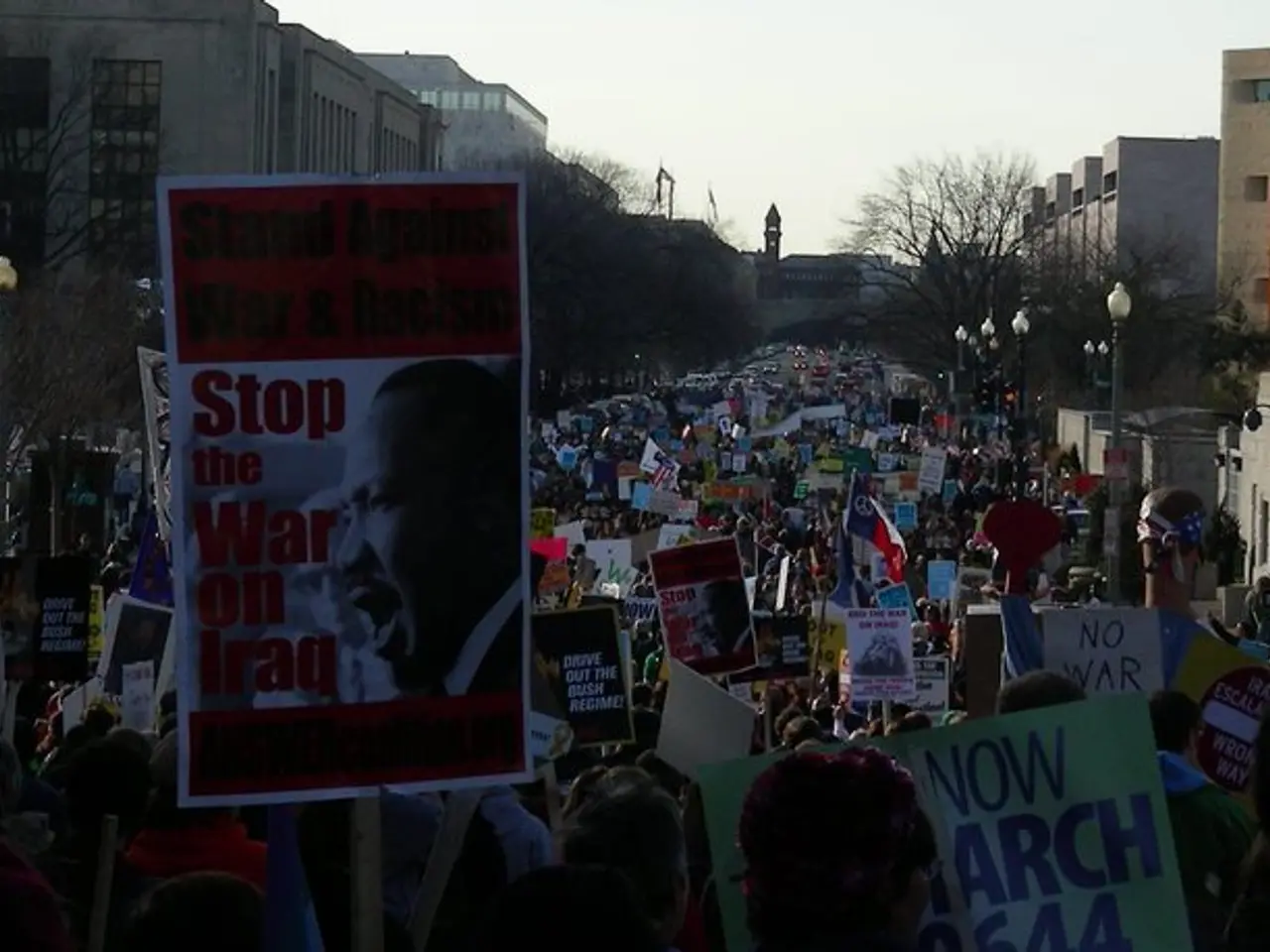Pro-Palestinian demonstrators disregard new legislation, leading to the arrest of 365 individuals by London police.
The UK government's decision to ban Palestine Action under terrorism legislation in July 2025 has sparked widespread civil disobedience and protests, with over 100 arrests and concerns over freedom of expression and the suppression of dissent.
The ban, which is the first time a direct-action group has been proscribed as a terrorist organization in Britain, was led by Home Secretary Yvette Cooper and passed with only 26 MPs opposing. The move came following incidents where activists broke into military airfields and caused property damage, actions interpreted by the government as justifying terrorism charges.
The legal context centers on the UK Terrorism Act 2000, which defines terrorism broadly enough to include serious damage to property. However, this broad interpretation has been criticized by the UN Human Rights Chief Volker Türk, who warns that the UK’s use of counter-terrorism laws "misuses" the legal definition of terrorism by expanding it beyond acts aimed at causing death or serious injury, intimidation, or hostage-taking, to include actions that are already criminal offenses under ordinary law.
The ban has been controversial both domestically and internationally. Defend Our Juries, organizers of the protest, stated that the right to freedom of expression has no meaning and democracy is dead if the meaning of "terrorism" is extended to include those causing economic damage or embarrassment. The scale of the events in London is expected to put pressure on the police department, according to Deputy Assistant Commissioner Ade Adelekan.
The protests reached a climax on Saturday, with over 365 people arrested during a pro-Palestinian group demonstration in central London. The protesters, who wanted to be arrested in large numbers, intentionally flouted the law as part of their effort to force the government to reconsider the ban on Palestine Action. The demonstration was unusual in that many of those arrested were peaceful demonstrators and symbolic supporters, such as an elderly priest and a cartoon-holder, who were arrested under the Terrorism Act for showing support to the group.
The protesters filled the square outside the Houses of Parliament and many displayed signs reading "I oppose genocide. I support Palestine Action." However, the Metropolitan Police Service disputed the organizers' claim, stating that many of those gathered in the square were onlookers, media, or people who didn't hold placards supporting the group.
The controversy surrounding the ban extends beyond the UK. A leaked report later questioned the government's justification, with intelligence assessments doubting that Palestine Action’s actions meet the threshold for terrorism, further fueling debate over the legitimacy and proportionality of the ban.
Palestine Action has previously targeted Israeli defense contractors and other sites in the UK believed to have links with the Israeli military. The group's supporters argue that the government aims to suppress legitimate dissent and direct action against UK military support for Israel, which Palestine Action contends implicates the UK in alleged genocide in Gaza. Some voices, including opposition politicians, call for the ban to be lifted, warning about the chilling effect on free speech and activism more broadly.
In summary, the ban's legal rationale is based on a broad terrorism definition applied to acts of property damage by activists, while politically it reflects tensions over UK military support for Israel and the suppression of radical protest movements. The move has been controversial both domestically and internationally due to concerns over freedom of expression and the proportionality of counter-terrorism measures.
The controversial ban on Palestine Action, classified as a terrorist organization by the UK government in July 2025, has also been categorized under the UK Terrorism Act 2000, raising questions about the expansive interpretation of terrorism to include actions that cause serious damage to property. This debate over the legal definition of terrorism, which has been criticized by the UN Human Rights Chief Volker Türk, is closely linked to the politics of crime and justice, as the ban has been seen as an attempt to suppress legitimate dissent against UK military support for Israel. Furthermore, the general-news context around this issue highlights the widespread civil disobedience and protests, with a significant number of arrests and concerns over the suppression of freedom of expression.








